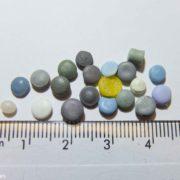Amsterdam/Brussels, 31 July 2018 – This month the European Parliament’s environment committee spoke out in favour of a ban on microplastics. It concerns microplastics that have intentionally been added to products such as cosmetics and detergents. The Commission also advocates a ban on oxo-degradable plastics. This type of plastic is broken down into small particles but does not break down in the environment.
Last March, the Special Rapporteur of the Environmental Committee wrote a report following the European Commission’s vision on plastic. That vision, A European Strategy for Plastics in a Circular Economy, was published earlier in January. Part of the vision is the policy regarding microplastics.
The European Commission has also asked the European Chemicals Agency (ECHA) for scientific information on the risks of microplastics for the environment and for human health. This information may provide the basis for a ban on microplastics. The European Parliament’s Environmental Committee now argues in favour of a ban without further delay. Environmental organisations welcomed this position in a joint Press release.
The plenary vote in the European Parliament will follow in September. If the Environment Committee’s proposals are adopted, it will be difficult for the European Commission to disregard the call of the Environment Committee for a total ban on micro-plastics.
Producers have already almost entirely removed the so-called microbeads from their products. This is the result of the Beat the Microbead campaign, led by the Plastic Soup Foundation, which started in August 2012. However, a European ban does not restrict itself to these microbeads with a scrub function, but includes all nano-and microplastics in care products, including lipstick, sun tan products and nail polish. These micro-plastics are widely used in cosmetics, see the reviews by brand and by country on https://www.beatthemicrobead.org/.





